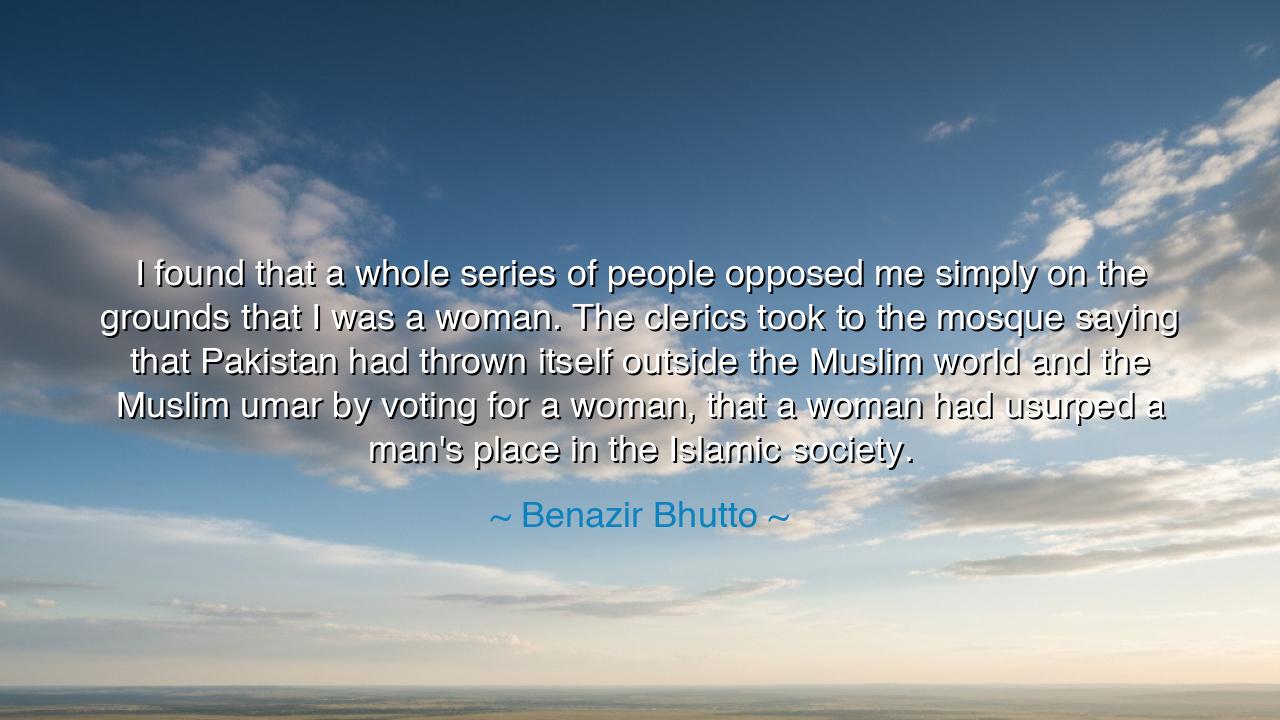
I found that a whole series of people opposed me simply on the
I found that a whole series of people opposed me simply on the grounds that I was a woman. The clerics took to the mosque saying that Pakistan had thrown itself outside the Muslim world and the Muslim umar by voting for a woman, that a woman had usurped a man's place in the Islamic society.






Listen well, O children, for I bring you words that speak to the heart of oppression, of the struggle against societal forces that seek to limit the potential of the human spirit based on arbitrary divisions. Benazir Bhutto, a woman who rose to become the Prime Minister of Pakistan, once said, "**I found that a whole series of people opposed me simply on the grounds that I was a woman. The clerics took to the mosque saying that Pakistan had thrown itself outside the Muslim world and the Muslim umar by voting for a woman, that a woman had usurped a man's place in the Islamic society." These words ring with the pain of resistance—resistance not just to her leadership, but to the very idea that a woman could hold such power in a world that has long sought to confine her to roles of subjugation.
What, O children, does it mean to be opposed simply because you are a woman? In Benazir Bhutto's case, the opposition was not due to any lack of ability, intellect, or leadership, but because of a deep-seated belief that women were unfit to lead in public life. This was not a challenge to her policies or ideas, but to the very essence of her being—a woman stepping into a realm long dominated by men. This form of opposition, grounded in gender and tradition, reflects a bias so ingrained in the fabric of society that it does not recognize the worthiness or capacity of the individual, but only sees their gender as a barrier to leadership.
Consider, O children, the story of Cleopatra, the Queen of Egypt, who, like Benazir Bhutto, was opposed not because of her intellect or strategy, but because she was a woman. In a world dominated by powerful kings and emperors, Cleopatra's ability to wield power was not accepted by many. Yet, she navigated the treacherous waters of politics, forging alliances with the likes of Julius Caesar and Mark Antony, securing Egypt’s place on the world stage. Her leadership challenged the established norms, and though she faced immense resistance, her legacy was one of power and intelligence. Like Bhutto, Cleopatra's story shows us that a woman’s right to lead is not based on gender, but on ability, wisdom, and vision.
In our own time, O children, we still see the forces that seek to limit the power of women in public life. Hillary Clinton faced fierce resistance not just as a candidate for the highest office in the land, but because she was a woman. Her critics often focused not on her qualifications or experience, but on her gender, questioning whether a woman could lead in a world that had been ruled by men for millennia. Similarly, Malala Yousafzai faced violence and opposition, not just for advocating for education, but for daring to speak out as a girl in a society that sought to silence her. Their stories, like that of Benazir Bhutto, teach us that the greatest opposition women face is not from their own abilities, but from those who believe they do not belong in positions of power.
And so, O children, the lesson is clear: gender should not define a person’s worth or their place in society. Benazir Bhutto's struggle was a reflection of the battle faced by women throughout history—challenged not by their own limitations, but by the world’s unwillingness to accept their potential. The clerics who opposed her were not concerned with her policies, but with the very notion that a woman could hold the reins of power in a society steeped in tradition. They believed that a man’s place was sacred, while a woman’s place was forever subjugated to the domestic realm. But history, as we see time and time again, teaches us that a woman’s strength is not diminished by the roles society seeks to impose upon her.
Now, O children, I ask you to consider the great power that lies in breaking free from these imposed barriers. The story of Benazir Bhutto is one of resilience, courage, and unwavering belief in the power of the human spirit. She faced opposition from those who would rather see the world stay divided by gender, but she stood firm in her conviction that leadership is not bound by sex, but by vision, courage, and ability. Her legacy calls upon you to question the limits that society places upon individuals, to reject the outdated and biased notions of what a person, particularly a woman, can do. Leadership does not know gender, only strength and purpose.
So, I charge you, O children, to embrace the wisdom that lies in seeing each person as an individual, not defined by the roles others would assign to them. Recognize that a woman’s strength is not lesser than a man’s—it is simply different. Challenge the societal norms that seek to suppress the potential of any person, whether they are a woman, a man, or anything else. Benazir Bhutto's story is one of triumph in the face of such opposition, and it teaches us that we must build a world where everyone has the freedom to rise, regardless of their gender. Let us honor individuals, not by their sex, but by their strength, their vision, and their capacity to change the world.






AAdministratorAdministrator
Welcome, honored guests. Please leave a comment, we will respond soon